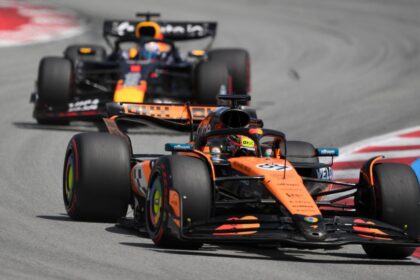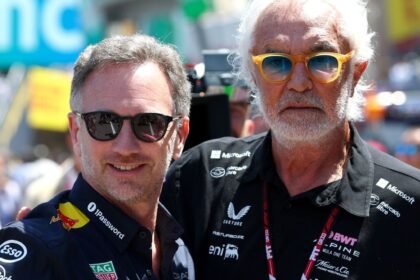Lewis Hamilton’s Anímic Descent at Ferrari: End of an Era?
The atmosphere in London’s O2 Arena exploded as the unmistakable silhouette of Lewis Hamilton emerged from the mist. The seven-time Formula 1 world champion, dressed in a red suit and flanked by his new teammate Charles Leclerc and team boss Frédédric Vasseur, greeted the crowd with a wide smile. It seemed like the beginning of something momentous. Ferrari’s presentation at the F1 75 pre-season launch event in February was the loudest among the ten teams, by a wide margin. Hamilton, excited about his big move from Mercedes, a move that had been in the works for a year, radiated optimism. The sport’s most prominent figure was joining the biggest team, in a title drought that went back to 2008. The 40-year-old English driver declared to the crowd that he felt “revitalized” by his new challenge. He and Leclerc, who had driven the new car on the Fiorano test track, were discreetly confident for the year that was beginning. They even spent time playing online chess as new teammates. The energy, as the youngsters say, was unbeatable. Hamilton seemed like a reborn man. It was as if Ferrari had added the final ingredient missing from their F1 operation. But that was then. Now, the expectation and excitement that Hamilton brought to Ferrari have disappeared so quickly that it’s hard to believe they ever existed. McLaren, which almost surpassed Ferrari in the constructors’ championship last year, has shown dominance. Hamilton’s victory in the China sprint race in April and a few podiums for Leclerc are all the Italian team has achieved in 2025 before the summer break. Both Mercedes and Red Bull, which are behind Ferrari in the standings, can at least boast a Grand Prix victory this year. The worst part is that Hamilton’s euphoria seems to have given way to complete surrender. Anyone who has followed Ferrari’s rollercoaster for years could say, without much thought, that it only took the Italian team 14 races to destroy the morale of the best driver of all time. Perhaps Hamilton’s comments in Budapest, where he said he was “absolutely useless”, will be how this millionaire move is remembered. Time will tell. On Sunday evening, Hamilton seemed on the verge of throwing in the towel completely. “They probably need to change drivers,” said a dejected Hamilton on Saturday after being eliminated from Q1 in a session in which Leclerc, surprisingly, took pole. It was a remarkable statement from someone with a £60 million-a-year contract, the man with the most poles and victories of anyone. It’s fair to wonder what Ferrari chairman John Elkann, who invested that money to bring him to the team, must have thought when hearing such a defeatist opinion. After finishing in 12th place, his mood didn’t improve much. He cryptically said that “there are many things going on in the background… that are not good.” In response to a question about the Dutch Grand Prix, which follows the three-week August break, he said: “I hope to return, yes.” Ferrari’s home race, the Italian Grand Prix in Monza, a kind of pilgrimage for the team’s legendary tifosi, takes place seven days later. Considering how things were a few months ago, it’s amazing to see how quickly things have changed. While Hamilton has repeatedly said that his focus is on being fully integrated in time for the 2026 rule change, Ferrari hopes to catapult themselves to the top of the hierarchy, but Hamilton is not talking or driving like a man capable of facing that challenge should it occur. Things were slightly better in the other Ferrari on Sunday. While Leclerc’s sublime lap in the pole had triggered Hamilton’s comments, the way his race unfolded was painfully familiar to anyone who has followed this team in the modern era. It was a race win that seemed tantalizingly possible, until, suddenly, it wasn’t. Ferrari fans know that feeling very well. Leclerc’s radio messages had a familiar tone.Leclerc was right. After leading the early stages of the race, his car’s pace plummeted at the end, and he slid helplessly to fourth place. Then he returned to what has become a well-rehearsed routine at this point. After criticizing the team over the radio during the race, when faced with the glare of the spotlights in the television press area, he retracted his criticisms. “I spoke too quickly,” he said shortly after the checkered flag, pointing to a problem with the chassis and not with the configuration changes at the last pit stop that he felt had ruined the pace he had had all weekend. The explanation might have been valid, but the routine of criticizing and retracting is a bit tiresome at this point. It only reinforced the persistent feeling that, in Leclerc, Ferrari has a mega-talented and likeable guy who is hard on the team when he speaks in the sanctuary of the cockpit, but less so once he has come out. But Ferrari can at least console themselves with Leclerc’s incredible ability to pull something out of nothing. The same cannot be said of Hamilton. The Hungarian Grand Prix was a weekend in which there were no positives for the man in car number 44.“We are going to lose this race with these things. We are losing a lot of time,” he said at one point. He later added: “This is incredibly frustrating. We have lost all competitiveness. You just have to listen to me… It’s a miracle if we finish on the podium.”
Charles Leclerc
Has Hamilton finished?
In the best-case scenario, Hamilton’s comments were very alarming. Whether they were seen as he said them on television or read later, they seemed to have been uttered by someone who considered waving the white flag and leaving it all at that moment. At one point in his interview with Sky Sports F1 on Sunday night, he seemed to be genuinely struggling to speak without falling apart.
Just one week before the Belgian Grand Prix, Hamilton was defiant and confident. He told the media that he was determined not to follow the example of other legends like Fernando Alonso and Sebastian Vettel by not winning a championship for Ferrari. Hamilton revealed that he had been writing documents for the team highlighting the areas in which he was not performing. It was exactly the kind of thing that Ferrari should be grateful for: a man with so much experience pointing out the flaws in the functioning of a team that lacks real experience in winning F1 titles at all levels. However, after that revelation, it’s difficult to escape the obvious fact. Two of Hamilton’s worst weekends driving a red car followed that revelation about the documents. A cynic could easily say that, while Alonso and Vettel ultimately failed to win the grand prize for Enzo Ferrari’s team, both won early in their debut season and left the team with a double-digit win count. Save for that weekend in Shanghai, Hamilton hasn’t come close to doing any of those things. Perhaps that partly explains the last episode of emotional transparency to which Wolff alluded. Mercedes saw a lot of that in the years following Hamilton’s agonizing 2021 Abu Dhabi Grand Prix. In the last months of his tenure with the team last year, even with the emotional excitement of his wonderful victory at the 2024 British Grand Prix, the doubt was clear. The man with the most poles of anyone ended his tenure with the Silver Arrows publicly declaring that he had lost his previous magic in a single lap. The emotional rollercoaster has been evident this year. His pole and victory in the Shanghai sprint race turned out to be a brief moment of euphoria. After finishing fourth in Austria and then in Great Britain, setbacks in successive weekends in Belgium and Hungary entering the summer break have moved the needle towards the wrong end of the scale. Externally, Ferrari has not shown any persistent concern about Hamilton’s spiraling form and his increasing defeatism. Vasseur downplayed the situation.“That’s Lewis with his heart on his sleeve,” said Wolff. “It was very raw. He was disappointed with himself. We’ve had it in the past when he felt he hadn’t met his own expectations. He’s been emotionally transparent since he was a young adult. He will beat himself up.”
Toto Wolff
Numerous theories have been proposed to explain Hamilton’s difficulties this year. Without a doubt, he has openly become frustrated on numerous occasions by Ferrari’s race strategy (his interactions with race engineer Riccardo Adami often sound more like two incompatible people on an awkward blind date than a Formula 1 race driver and a race engineer), but it is unfair to simply point to Ferrari, especially after a weekend in which his teammate took pole and should have finished on the podium. The problems go beyond Budapest. Hamilton’s form simply hasn’t been at the level everyone expected. The timing of his team change could be an explanation. A trend this year has been how, in the last year of the regulation cycle, drivers have struggled to switch to new cars; Carlos Sainz, who had to make way for Hamilton at Ferrari, has been equally inconsistent at Williams. Hamilton has talked about how different things are at Ferrari compared to Mercedes. Earlier in the year, he and Sainz joked about how their new teams chart lap times in the opposite way to what they are used to, meaning they both started the year looking at data that seemed to be backwards. While that might be the case, Hamilton’s achievements and his legacy to this point serve as a double-edged sword: even if it’s a bad time to have switched teams, the excuse doesn’t work when you boast the greatest statistics the sport has ever seen. That Sainz, a multiple race winner, is struggling is irrelevant compared to a competitor with a legacy like Hamilton’s. Perhaps the difficulties of English at Hungaroring, the scene of his first victory with Mercedes in 2013 and a place considered one of his strongest circuits, reinforced the feeling that he simply hasn’t been able to make the difference he used to make in his old team. Much was made of a visit Hamilton made to Mercedes at Spa-Francorchamps, seven days before the race in Budapest. Both Hamilton and Mercedes said it was simply a visit to catch up with old colleagues and give his struggling replacement, the Italian teenager Kimi Antonelli, a pat on the back. But it came after a series of equally frank comments to the media after being eliminated from Q1 in qualifying for both the sprint race and the Grand Prix. Perhaps it’s not surprising that, at a time of such low confidence, Hamilton sought the familiarity of his championship days, even if it was just for a fleeting visit. All of this would have seemed unthinkable to the crowd at the O2 Arena in February. The atmosphere, once so good, is now sour. Hamilton still has time to turn things around. Ferrari could come out of the blocks as the team to beat next season, but after Budapest, the question isn’t so much whether Ferrari can give him a title-winning car, but whether he still believes he is a driver who can win with one. Of all Ferrari’s problems, that might be the most alarming of all.“I don’t need to motivate him,” Vasseur said on Sunday night. “Honestly, he is frustrated, but not demotivated… Sometimes, right after the race or right after qualifying, you are very disappointed and the first reaction is harsh, but we all know that we are pushing in the same direction.
Frédéric Vasseur











